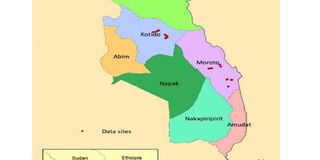Napak District has no government-aided secondary school – report

What you need to know:
- According to the Ministry of Education policy framework, the government is supposed to establish a secondary school at every sub-county and a primary school at every parish
A new report by Anti-corruption Coalition Uganda has revealed that Napak District in the Karamoja sub-region does not have any government-aided secondary school.
According to the Ministry of Education policy framework, the government is supposed to establish a secondary school at every sub-county and a primary school at every parish.
“Napak District has seven sub-counties without government-aided secondary schools and 20 parishes without government-aided primary schools with only 10 community schools being coded,” the report shows.
The report adds that Nakapiripirit District in the same sub-region has seven sub-counties without secondary schools including; Lemusuie, Kawach, Namalu, Loreng, Tokora, Kakomongole and Moruita.
Nabilatuk District has three sub-counties without secondary schools including; Natalia, Kosike and Nabilatuk in addition to 10 parishes without primary schools.
Moroto District as well has three sub-counties without secondary schools such as; Lotisan, Loputuk and Nadunget in addition to 21 parishes without primary schools.
Many children from these sub-counties and parishes miss out on affordable primary and post-primary education opportunities, the report states.
Mr Alex Atwijukye, Project Officer Anti-Corruption Coalition Uganda said Nabilatuk should be considered under the U Gift program most especially for the construction of schools.
“The Ministry of Education and Sports should increase school facility grant most especially capital development for the primary schools and secondary schools. Some of the existing primary schools are in a sorry state and pupils share toilets and urinals with teachers,” he said.
He adds that the Ministry of Education should institutionalize school feeding programs for local governments and strengthen community participation because most of the factors lie outside the direct influence of the school authorities.
Mr Atwijukye emphasized the need for government to follow up on school dropouts especially the girls to avoid early marriages.




